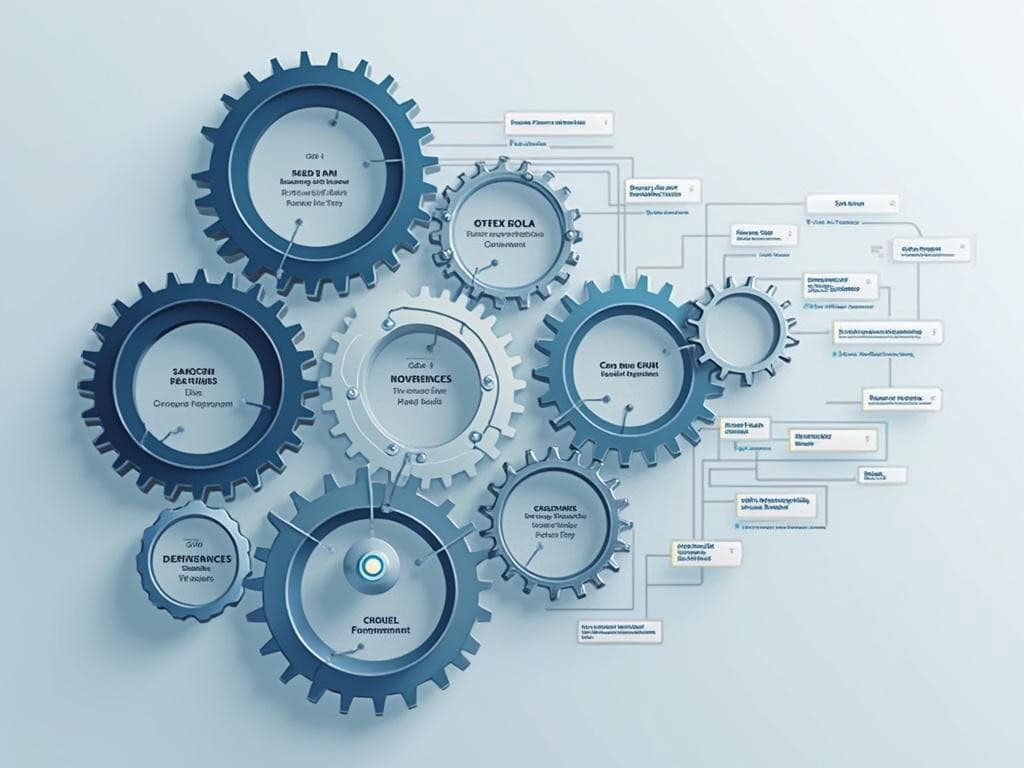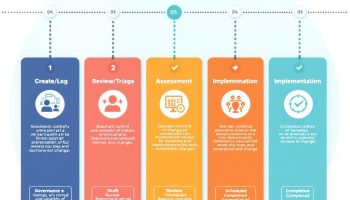
The Project Management Body of Knowledge (PMBOK)
The PMBOK serves as a complete framework created by the Project Management Institute (PMI). It has grown from a simple collection of best practices into the global benchmark for project management excellence. Since 1969, the PMBOK has adapted to address new challenges, giving project managers a standardized approach that works across different industries and methods.
Key Takeaways:
- The PMBOK framework consists of five Process Groups and ten Knowledge Areas that create a complete project management system.
- PMI has regularly updated the PMBOK to reflect industry changes, technological advancements, and emerging methodologies.
- The framework offers guidance on risk response strategies, stakeholder engagement, and project management principles.
- PMBOK provides a structured approach that can be applied across diverse industries and project complexities.
- Professional certifications like PMP certification are built upon the PMBOK framework, enhancing career opportunities for project management professionals.
The framework’s practical organization helps you manage projects with confidence while maintaining flexibility for specific needs. Each update incorporates feedback from practicing project managers and responds to shifting business trends. This dynamic nature makes the PMBOK particularly valuable in today’s fast-paced professional environment.
You’ll find the PMBOK especially helpful when tackling complex projects that require clear documentation and consistent processes. Many organizations adopt its terminology and processes to create a common language for project teams, improving communication and reducing misunderstandings.
For newcomers to project management, the PMBOK Guide offers a structured learning path. Experienced managers often use it as a reference point when developing custom methodologies or resolving specific project challenges.
The framework balances technical rigor with practical application, making it suitable for both theoretical study and real-world implementation. Its influence extends beyond individual projects to shape organizational project management offices and strategic planning approaches.
As industries continue to change, the PMBOK adapts while maintaining its core strengths. This balance between stability and innovation makes it a trusted resource for project professionals facing new challenges like remote team management and agile transformation.
“The PMBOK has evolved into a global standard for project management excellence, offering a structured yet adaptable framework that empowers professionals to navigate diverse challenges across industries. By integrating best practices, risk strategies, and stakeholder engagement, it not only enhances career opportunities through certifications like PMP but also fosters a culture of continuous improvement in project delivery.”
Historical Evolution of Project Management Standards
The Project Management Body of Knowledge (PMBOK) has traveled a remarkable journey since its inception. Founded by the Project Management Institute (PMI) in 1969, the PMBOK project management body of knowledge has evolved from a modest collection of best practices to the gold standard for project management excellence worldwide.
The evolution of the PMBOK project management body of knowledge follows several pivotal milestones that shaped modern project management practice. In 1984, PMI awarded the first Project Management Professional (PMP) certification, establishing formal recognition for project management expertise. This certification has become one of the most sought-after credentials in the business world, validating professionals’ understanding of the PMBOK project management body of knowledge principles.
The true breakthrough came in 1987 when PMI published the first standalone PMBOK document. This initial guide formalized the project management body of knowledge into a cohesive framework. Since then, PMI has regularly updated the PMBOK project management body of knowledge to reflect industry changes, technological advancements, and emerging methodologies.
Transformation Through Editions
Each edition of the PMBOK project management body of knowledge has introduced significant improvements:
- First Edition (1996): Established the foundation with basic processes and knowledge areas
- Fourth Edition (2008): Expanded alignment with other PMI standards
- Sixth Edition (2017): Introduced agile approaches and adaptive methodologies
- Seventh Edition (2021): Shifted from process-based to principle-based approach
The continuous refinement of the PMBOK project management body of knowledge demonstrates PMI’s commitment to keeping the framework relevant in a rapidly changing business environment. This evolution has been crucial for maintaining the project management discipline’s relevance across industries.
As projects have grown more complex, the PMBOK project management body of knowledge has expanded to address emerging challenges. The framework now offers guidance on risk response strategies and stakeholder engagement that weren’t explicitly covered in early editions.
The PMBOK project management body of knowledge remains adaptable while maintaining its core purpose: providing a standardized approach to project management that transcends industries, geographies, and methodologies. This consistent evolution ensures you can apply these principles to projects regardless of size or complexity.
Expert Insight: To stay relevant in the ever-evolving field of project management, regularly revisit the Project Management Body of Knowledge (PMBOK) as it adapts to contemporary challenges and methodologies. Understanding the historical evolution of PMBOK—from its foundational principles to its latest principles-based approaches—will enhance your project management skills and broaden your strategic thinking. Embrace the continuous refinement of these standards to not only validate your expertise but also to ensure successful project outcomes across various industries.
Core Structure of PMBOK Framework
The PMBOK (Project Management Body of Knowledge) framework forms the backbone of modern project management practices. This comprehensive structure gives you a standardized approach to manage projects effectively across industries. The PMBOK project management body of knowledge is organized around five essential Process Groups and ten Knowledge Areas that work together to create a complete project management system.
The five Process Groups create a logical sequence for project execution:
- Initiating: Defines new projects or phases and obtains authorization
- Planning: Establishes scope, refines objectives, and plans actions
- Executing: Completes work defined in project management plans
- Monitoring and Controlling: Tracks and regulates progress and performance
- Closing: Finalizes all activities to formally complete projects or phases
These Process Groups interact with ten Knowledge Areas that represent specialized aspects of project management. The PMBOK project management body of knowledge covers these crucial domains:
- Integration Management: Coordinates various project elements and processes
- Scope Management: Ensures projects include all required work
- Schedule Management: Develops and controls timelines
- Cost Management: Plans, estimates, and controls budgets
- Quality Management: Ensures projects meet quality requirements
- Resource Management: Identifies and manages project resources
- Communication Management: Plans and executes information exchange
- Risk Management: Identifies and responds to project risks
- Procurement Management: Acquires necessary products and services
- Stakeholder Management: Identifies and engages people affected by projects
Across these Process Groups and Knowledge Areas, the PMBOK project management body of knowledge defines 49 distinct processes. Each process has specific inputs, tools, techniques, and outputs to guide your implementation.
Practical Application of PMBOK Processes
The PMBOK framework offers practical tools to handle project challenges. When you need to coordinate multiple project components, project integration management provides techniques to bring everything together coherently. For complex stakeholder situations, use the stakeholder satisfaction strategies outlined in the framework.
The table below highlights key project artifacts associated with each Knowledge Area:
| Knowledge Area | Primary Artifacts |
|---|---|
| Integration | Project Charter, Project Management Plan |
| Scope | Requirements Documentation, WBS |
| Schedule | Project Schedule, Activity List |
| Cost | Cost Baseline, Budget |
| Quality | Quality Management Plan, Quality Metrics |
| Resource | Resource Breakdown Structure, Team Charter |
| Communication | Communication Management Plan |
| Risk | Risk Register, Risk Response Plan |
| Procurement | Procurement Documentation, Contracts |
| Stakeholder | Stakeholder Register, Engagement Plan |
The PMBOK project management body of knowledge helps you implement effective risk response strategies and establish critical success factors for your projects. This structured approach enables you to handle complexities and deliver consistent results.
Expert Insight: To leverage the PMBOK framework effectively, familiarize yourself with its five Process Groups and ten Knowledge Areas, as these form the foundation for successful project management. By understanding the logical flow of Initiating, Planning, Executing, Monitoring and Controlling, and Closing, you can systematically address project requirements and challenges. Additionally, utilize the specific tools and artifacts associated with each Knowledge Area to enhance coordination and stakeholder engagement, thereby ensuring project success across various sectors.
Critical Knowledge Areas Deep Dive
The PMBOK (Project Management Body of Knowledge) framework encompasses ten knowledge areas that form the foundation of effective project management. These knowledge areas aren’t just theoretical concepts—they’re practical tools you can apply to enhance project success rates and delivery efficiency.
Integration Management serves as the cornerstone of the PMBOK project management body of knowledge framework. This area coordinates all project elements, ensuring they work together seamlessly. You’ll need to develop comprehensive project charters, management plans, and change control processes to keep your project unified. When implementing project integration management effectively, you’ll reduce conflicts between competing objectives and resources.
Scope Management defines clear project boundaries and prevents scope creep—one of the most common causes of project failure. The PMBOK project management body of knowledge guides you to create detailed scope statements, Work Breakdown Structures (WBS), and verification processes. This knowledge area helps you manage stakeholder expectations and avoid the costly mistake of delivering something different from what was requested.
Here’s how the PMBOK project management body of knowledge areas interconnect:
| Knowledge Area | Primary Function | Key Tools |
|---|---|---|
| Integration Management | Coordinates all project elements | Project charter, management plan |
| Scope Management | Defines project boundaries | WBS, requirements documentation |
| Schedule Management | Controls project timelines | Gantt charts, Critical Path Method |
| Cost Management | Budgeting and cost control | Earned Value Management, S-curves |
| Quality Management | Ensures deliverables meet requirements | Quality metrics, control charts |
Schedule Management helps you control project timelines using techniques like the Critical Path Method. This knowledge area from the PMBOK project management body of knowledge ensures activities are sequenced logically and completed efficiently. You’ll develop realistic schedules that account for resource availability and dependencies while building in appropriate buffers for risk response strategies.
Essential Tools and Techniques
The Work Breakdown Structure (WBS) breaks down deliverables into manageable components, making complex projects easier to plan and execute. Using WBS helps you identify all necessary work packages while ensuring nothing critical is overlooked. The PMBOK project management body of knowledge emphasizes this tool as fundamental to successful scope definition.
Earned Value Management (EVM) integrates scope, schedule, and cost measurements to assess project performance. This technique from the PMBOK project management body of knowledge allows you to answer critical questions: Are you ahead or behind schedule? Are you over or under budget? By calculating metrics like schedule variance, you can take corrective action before small issues become major problems.
Organizations that successfully implement project management practices see a 29% increase in project success rates.
forbes.com
Global Recognition and Industry Impact
The PMBOK (Project Management Body of Knowledge) has achieved extensive international recognition as the premier framework for project management. You’ll find the PMBOK endorsed by leading standards organizations worldwide, including the American National Standards Institute (ANSI), Institute of Electrical and Electronics Engineers (IEEE), and International Organization for Standardization (ISO). This triple validation establishes the PMBOK as the gold standard for professionals seeking structured approaches to project execution.
Educational institutions have integrated the PMBOK into their curriculum across continents, ensuring new graduates enter the workforce with standardized project management terminology and methodologies. The framework’s universal acceptance means your project management skills remain relevant whether you’re managing global virtual projects or leading local initiatives.
Cross-Industry Implementation
The PMBOK transcends industry boundaries, making it an invaluable tool for professionals in diverse sectors. You can apply its principles across construction, information technology, healthcare, and manufacturing contexts with equal effectiveness. This cross-disciplinary approach helps you establish consistent project delivery frameworks regardless of your organization’s specific focus.
Many Fortune 500 companies have adopted the PMBOK as their standard approach, creating a common language for project teams. You’ll find its methodology particularly useful when coordinating complex projects requiring multiple departments or external vendors. The framework provides clear guidelines for project communication across organizational boundaries.
| Industry | Primary PMBOK Applications | Implementation Rate |
|---|---|---|
| IT/Software | Structured development lifecycle, risk management | 78% |
| Construction | Scope definition, procurement, timeline control | 65% |
| Healthcare | Quality management, stakeholder engagement | 53% |
| Manufacturing | Process standardization, resource optimization | 61% |
| Finance | Cost control, compliance management | 72% |
The PMBOK has revolutionized how organizations approach project planning and execution. You can leverage its comprehensive framework to improve project success rates and execute your projects with greater confidence. The structured approach helps you avoid common pitfalls while ensuring all critical aspects of project management receive proper attention.
Organizations that adopt standardized project management practices see a 25% improvement in project performance compared to those that do not.
forbes.com
Practical Applications and Professional Development
The PMBOK (Project Management Body of Knowledge) provides a flexible framework you can adapt to various project management methodologies. This industry-standard resource helps you standardize practices, boost efficiency, and align stakeholder expectations within your organization. The PMBOK project management body of knowledge serves as both a reference guide and professional development roadmap.
You’ll find the PMBOK project management body of knowledge particularly valuable when implementing different forms of project management across your organization. By establishing consistent terminology and processes, you can significantly reduce misunderstandings and improve cross-team collaboration.
Career Advancement Through PMI Certifications
Leveraging the PMBOK project management body of knowledge for professional development offers tangible career benefits. The framework underpins two prestigious certifications:
- Certified Associate in Project Management (CAPM): Entry-level certification requiring knowledge of PMBOK fundamentals
- Project Management Professional (PMP): Advanced certification demonstrating mastery of PMBOK concepts and practical application
These credentials can substantially increase your marketability and earning potential. According to PMI data, PMP-certified professionals typically earn 20% more than their non-certified counterparts.
The PMBOK project management body of knowledge also supports your continuous learning journey. You’ll develop crucial skills for executing your projects more effectively while staying current with emerging trends. The framework provides structured guidance for:
- Developing customized project management methodologies
- Implementing standardized documentation practices
- Creating consistent project evaluation metrics
- Building robust risk management strategies
- Establishing effective stakeholder engagement protocols
When you adopt PMBOK practices, you’ll enhance your ability to manage project communication through standardized templates and processes. This systematic approach helps avoid critical information gaps that often derail projects.
You can apply PMBOK principles to strengthen your stakeholder identification processes, ensuring all key parties are engaged from project inception. The framework’s emphasis on thorough planning also helps you develop more accurate project estimates, reducing the likelihood of scope creep and budget overruns.
The PMBOK project management body of knowledge provides invaluable guidance for addressing project roadblocks through its comprehensive risk management approaches. You’ll gain tools to proactively identify, assess, and mitigate potential issues before they impact project delivery.






